|
|
|
Sort Order |
|
|
|
Items / Page
|
|
|
|
|
|
|
| Srl | Item |
| 1 |
ID:
178622
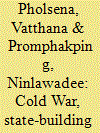

|
|
|
|
|
| Summary/Abstract |
This article analyzes two key frontlines during the Cold War, border areas in the provinces of Savannakhet (central Laos) and Nakhon Phanom (northeastern Thailand), adjacent to the Lao-Vietnamese and Thai-Lao borders, respectively. We investigate the distinct transformative experiences of war and revolution on members of the same ethnic minority – the Phutai – in both locations. The wartime trajectories of these populations diverged significantly, partly because their territories experienced very different pre-Cold War histories. As a consequence, Phutai in Thailand moved through homogeneous ethnic space between Thailand and Laos. In contrast, the Phutai in Laos, hemmed in by political, topographic, and ethnic boundaries, contributed to the building of a communist proto-state. The Phutai were confronted by different communist projects, which also shaped their distinct revolutionary experiences: the Communist Party of Thailand (CPT) boosted ethnic minorities’ resistance against the Thai state’s nationalist ideology, while the Lao revolutionary movement facilitated ethnic minorities’ social mobility within the Pathet Lao apparatus. Whether through confrontation in Thailand or accommodation in Laos, Phutai in both locations played active roles in the multi-layered history of the region.
|
|
|
|
|
|
|
|
|
|
|
|
|
|
|
|
| 2 |
ID:
076277
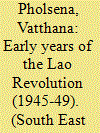

|
|
|
| 3 |
ID:
084452
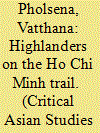

|
|
|
|
|
| Publication |
2008.
|
| Summary/Abstract |
The history of the hinterlands of the Indochinese peninsula, astride the frontier between Laos and Vietnam, during the first and second Indochina wars (1946-75) is arguably the least informed of this turbulent period. The aftermath of World War II saw the establishment of revolutionary bases at the junction between southeastern Laos and central and southern central Vietnam in highly strategic areas that were conduits for the "Ho Chi Minh Trail." This article aims to go beyond conventional diplomatic and military histories of the Indochina wars to examine war from below. In particular, the second half of the article is constructed around the narratives of two female war veterans of ethnic minority origins who conducted most of their revolutionary activities during the Vietnam War along the Ho Chi Minh Trail. Particular attention is given to their motivations and wartime lives, linked to their transformation from members of upland populations who not long ago were described as "savages" into "revolutionaries" and "patriots."
|
|
|
|
|
|
|
|
|
|
|
|
|
|
|
|
| 4 |
ID:
141904
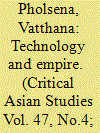

|
|
|
|
|
| Summary/Abstract |
The Tonkin–Yunnan railway constituted a significant piece of transport infrastructure of the French colonial empire in Asia. The 848-kilometer railroad was a technical achievement that took ten years to complete (1900–1910) at the cost of thousands of lives. Albert Marie, a young French engineer, worked on the construction of the Chinese section of the railway over a three-year period, from August 1904 to May 1907. Through the letters he sent to his family and the photographs he took during his assignment, vignettes of everyday life in the expatriate community and the local population, as well as of the daunting work on the construction sites in a hostile physical environment, are narrated in a very candid manner. The hardworking, ambitious, and (at times) bewildered engineer, like many of his contemporary fellow countrymen, was hopeful about French rule in parts of mainland Southeast Asia and southwestern China in the early twentieth century. Technology, in particular, was believed to be the instrument of civilization and modernity that would drive France's imperial expansion in the region and elsewhere; in 1907, Albert Marie left Yunnan to work on another daunting colonial railroad project, the Constantinople–Baghdad line.
|
|
|
|
|
|
|
|
|
|
|
|
|
|
|
|
| 5 |
ID:
099951
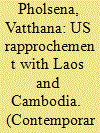

|
|
|
|
|
|
|
|